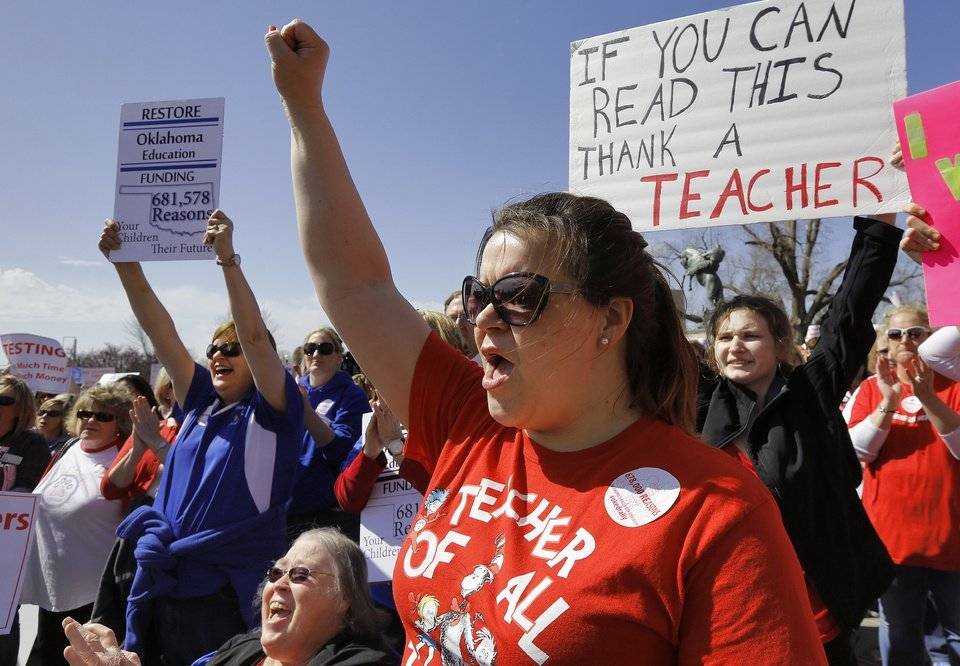

Marching into mass rally at Capitol building, April 9.
In “a hail-Mary pass” to stop the projected Jan. 10 strike by over 35,000 Los Angeles public school teachers and professional staff represented by United Teachers Los Angeles, the Los Angeles Unified School District filed a lawsuit Jan. 3 requesting an injunction to stop special education teachers from joining the strike. A federal court swiftly dismissed it on Jan. 4.
A UTLA statement noted: “This sneaky maneuver — especially coming from a district that has repeatedly ignored UTLA’s contract demands for special education class-size caps to relieve the burden of overcrowded special education classrooms — is beyond cynical and counterproductive.”
After nearly two years without a contract, months of bad-faith bargaining and many unfair labor practice charges, the UTLA is set to strike unless the LAUSD comes to the Jan. 7 final negotiating session ready to meet UTLA’s demands.
The teachers want LAUSD to use its $1.9 billion unrestricted reserves to fund smaller class sizes, more nurses, counselors and librarians; more support for special, early, bilingual and adult education classes; end “toxic overtesting”; empower parents and educators through stronger Local School Leadership Councils; and address the $600 million charter industry drain from public funding.
Given that 50,000 union and community members marched together on Dec. 15 supporting these social unionism demands for the district’s 600,000 students, UTLA President Alex Caputo-Pearl stated: “Our students and families are worth the investment, and the civic institution of public education in L.A. is worth saving.” (utla.net, Jan. 4) Support the LA teachers’ strike!
Court affirms controversial pro-worker ruling
The U.S. D.C. Circuit Court of Appeals upheld one of the most significant pro-labor rulings of the Obama administration on Dec. 28. The National Labor Relations Board ruling in the Browning-Ferris decision held corporations could be responsible for issues like wage discrimination or illegal job termination if employees were hired by contractors or worked for a franchised company.
As the NLRB noted about its 2015 ruling: “With more than 3.87 million of the nation’s workers employed through temporary agencies in August 2014, the Board held that its previous joint-employers standard has failed to keep pace with changes in the workplace and economic circumstances.”
No wonder Browning-Ferris Industries, supported by business groups and corporations like Microsoft, have loudly and fiercely fought the NLRB ruling.
But because the appeals court ruled that the NLRB failed to properly define what constitutes “indirect control” for purposes of meeting the joint-employer test, it sent the issue back to the NLRB for clarification.
But that “throws a big wrench into the business groups’ plans to overturn the joint-employer standard,” wrote The Intercept. “It also significantly constrains what the Republican-controlled NLRB can do to curtail labor rights going forward. The Trump administration, which has argued against expanding the meaning of joint-employers to include those who have indirect control over workers, will now have to comply with the court ruling.” (Jan. 3)
By contrast, the ruling has exciting implications for McDonald’s workers who initiated the struggle for Fight for $15 and a union. If this is eventually decided in their favor and McDonald’s is declared a joint employer, the road to unionizing will be much easier. On with the struggle for justice for all franchise and temporary workers!
19 states raise minimum wages Jan. 1
Due to struggles by workers and their allies, minimum wages in 19 states rose this year, with raises due in three states later in 2019. The highest rate is in the District of Columbia at $13.25 an hour, with Massachusetts and Washington state at $12. The lowest rates are in Georgia and Wyoming at $5.15, though the $7.25 federal (poverty) wage may apply.
New York City instituted $15 an hour for workplaces with 11 or more employees and $13.50 for those with 10 or fewer. The minimum is $12 in three counties and $11.10 elsewhere in the state. The minimum will reach $15 by 2022. The hourly minimum wage in Oregon, effective July 1, depends on the region: metro Portland $12, rural areas $10.50 and elsewhere $10.75. For businesses in California with 26 workers the minimum is $12 ($15 by 2022); for those with less, it’s $11 ($15 by 2023).
The rate rose to $11 in Arkansas (thanks to ballot initiative) and Maine, while it’s $11.10 in Colorado. Vermont’s minimum is $10.78, with Rhode Island’s $10.50. Ranging between $9.89 in Alaska and $9.10 in South Dakota are rates in Arkansas, Michigan and and Minnesota. Ranging between $8.85 in New Jersey and $8.50 in Montana are Delaware ($9.25 on Oct. 1) and Missouri (due to ballot initiative). Only Mississippi has no minimum wage, so the $7.25 federal rate applies.
Download the PDF May Day appeal to the working class Revolutionary change is urgent! Gaza…
Philadelphia On March 26, the Pennsylvania Supreme Court denied political prisoner Mumia Abu-Jamal permission to…
There are two important and overlapping holidays on April 22: Earth Day and Vladimir Lenin’s…
Twelve people were arrested April 9 for blocking traffic to Travis Air Force Base, a…
Secretary-General of Hezbollah Sheikh Naim Qassem delivered a speech on April 18, 2025. Resistance News…
Anakbayan Philadelphia held a rally on April 19 to demand the U.S. end its military…